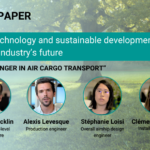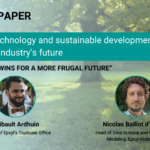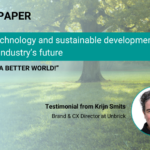KEONYS, a subsidiary of the international CENIT Group, has been awarded the EcoVadis Silver Medal for its social and environmental policy.
Interview with Axelle Mazé, VP Sustainability CENIT GROUP and CFO of KEONYS, on the challenges of Corporate Social Responsibility and the new CSRD directive.
KEONYS, integrator and distributor of Dassault Systèmes digital solutions, has announced the results of an assessment of its corporate social responsibility policy. This assessment, recognized by the EcoVadis rating platform, illustrates KEONYS’ performance in implementing its CSR commitments based on three pillars: environment, people and governance (ESG).
Could you briefly outline the three pillars?
A.M.: The first pillar – Environment – consists of measuring the company’s impact on its environment (for example, by measuring its carbon footprint). The second pillar deals with the place that people occupy within the company, and what is being done about it (employee skills development, diversity, well-being in the workplace). The third pillar concerns respect for ethical rules, both internally and with our value chain, and the protection of our data.
We are very concerned about the quality of our relationships with suppliers, customers and partners, and have put in place a number of rules (code of conduct, anti-corruption, export control) that define corporate behavior and best practices within our organization.
Have you implemented any sustainability initiatives at KEONYS recently?
A.M.: As part of our environmental policy, for example, we have launched a number of initiatives to raise awareness of climate change. Two of our employees agreed to be trained as “Fresque du climat” so that they could organize workshops within the company. This initiative has been very well received and has led to new awareness and discussions that have contributed to group cohesion. We have also decided to purchase 100% green energy in order to reduce our CO2 emissions.
Similarly, information and awareness-raising sessions on IT risks were launched at the Group’s initiative.
Last but not least, our website has been revamped to include a section dedicated to sustainable development.
As VP Sustainability for the CENIT Group, can you tell us more about the new CSRD directive?
A.M.: The CSRD (Corporate Sustainability Reporting Directive) is the new regulation that around 50,000 European companies will have to comply with when publishing extra-financial information.
This regulation follows on from the Green Deal launched by the European Commission in 2019, which aims to achieve carbon neutrality in Europe by 2050. Companies will be required to publish information on their social, environmental and governance impacts, in order to inform stakeholders and investors about their position on sustainability issues. Double materiality is the cornerstone of this new reporting, which examines the impact of the company on its environment (INSIDE-Out) and the impact of the environment on the company (OUTSIDE-In), generating risks and opportunities to be measured.
What do you think of its implementation and ambition?
A.M.: We’ve been discussing this topic at C3D, the Association of Corporate Directors for Sustainable Development of which I am a member, and it’s clear that CSR reporting by large companies will change radically by 2025. Listed groups in Europe with more than 500 employees will have to adapt their environmental, social and governance reporting based of this directive. Companies with more than 250 employees and a turnover of €50 million will follow in 2026.
The CSRD is extremely complex, given the number of indicators involved. I’m convinced that it will be a great opportunity for us to reinvent ourselves and mobilize for major change, rather than a constraint at the outset. Given the urgency of the climate crisis, biodiversity loss and water scarcity in the future years, the commitments inherent in CSRD will lead to a change in mindsets and production processes. Large companies and SMEs that have already embarked on their transformation will be the driving force, bringing in their wake challenges and opportunities for smaller entities to seize. The harmonization of best practices across the entire business ecosystem is a guarantee of dynamism and maturity for an engaged and sustainable society. We’ll need new human and technological investments – costly, admittedly, but necessary to curb the triangle of inaction. And it’s worth the effort! The returns on investment will be there.
What makes your position as CFO of KEONYS a plus?
A.M.: Thanks to the CSRD, our Group will be able to integrate the challenges it faces in a sustainable way at the heart of its strategy: the impact of the company on the environment and the impact of the environment on the company, which we will measure. This long and complex exercise is at the intersection of the finance function and sustainable development, as it involves performance measurement in the form of extra-financial reporting. Performance measurement, with the choice of KPIs and their monitoring, is a key element already inherent in the finance function (data collection, analysis, traceability, relevance of indicators).
We will publish our first report for the Group in 2025, based on the results of 2024.
What are your short-term objectives?
A.M.: As a premium partner of Dassault Systèmes, we also want to become the benchmark partner in terms of sustainability, through a label dedicated to our commitments. To this end, I am committed to being certified for Dassault Systèmes products that help our customers in their decarbonization initiatives.
Helping our customers digitalize their industrial processes is at the heart of our strategic challenges. Helping them reduce their carbon footprint, from product development to manufacturing and recycling, is an integral part of our mission. We are training our sales teams to raise awareness and enable them to understand and address our customers’ industrial and CSR challenges. Now is the time to strengthen our position as a key digital player in the decarbonization of industry.
To know more about this topic, you can download :
>> The White paper: Digital technology and sustainable development, shaping industry’s future
>> CENIT sustainability report 2023





